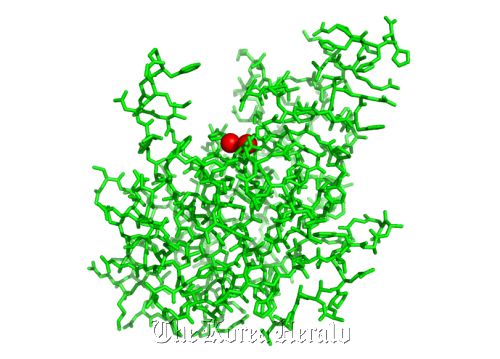A Korean firm said Monday it has identified the structure of a key protein that makes bacteria resistant to nearly all known antibiotics, paving the way for a treatment of the so-called superbug.
Researchers at Crystalgenomics Inc., a Seoul based bio-venture, have succeeded for the first time to find the shape of the New Delhi metallo-beta-lactamase, or NMD-1 enzyme that deactivates antibiotics.
Since its first detection in 2008, the NDM-1 superbug and its variants have been spreading fast across the world.
Researchers at Crystalgenomics Inc., a Seoul based bio-venture, have succeeded for the first time to find the shape of the New Delhi metallo-beta-lactamase, or NMD-1 enzyme that deactivates antibiotics.
Since its first detection in 2008, the NDM-1 superbug and its variants have been spreading fast across the world.

Crystalgenomics said that its findings have been registered with the Protein Data Bank of the U.S. and that it has filed for an international patent.
The company is now negotiating with several multinational pharmaceutical firms about developing treatments against bacteria that produce the NDM-1 enzyme.
NMD-1 is an enzyme that breaks down carbapenem antibiotics, which are used to treat patients infected by bacteria that are resistant to other beta-lactam antibiotics such as penicillin.
The protein was discovered in August 2010. The World Health Organization in the same month warned it poses a global health problem that could affect the control of diseases such as respiratory infections and dysentery.
The gene for the protein is thought to have originated in India and infection by that strain of bacteria was first described in 2008.
Bacteria infections with the NDM-1 protein have been found in about 22 nations including Australia, Canada and the United Kingdom.
As of December, South Korea had four patients who were confirmed to have been infected with NDM-1 bacteria.
Crystalgenomics is currently testing an antibiotic for another super-bacteria, Methicillin-resistant Staphylococcus aureus or MRSA,
By Choi He-suk (cheesuk@heraldcorp.com)


![[AtoZ into Korean mind] Humor in Korea: Navigating the line between what's funny and not](http://res.heraldm.com/phpwas/restmb_idxmake.php?idx=644&simg=/content/image/2024/04/22/20240422050642_0.jpg&u=)

![[Exclusive] Korean military set to ban iPhones over 'security' concerns](http://res.heraldm.com/phpwas/restmb_idxmake.php?idx=644&simg=/content/image/2024/04/23/20240423050599_0.jpg&u=20240423183955)

![[Herald Interview] Why Toss invited hackers to penetrate its system](http://res.heraldm.com/phpwas/restmb_idxmake.php?idx=644&simg=/content/image/2024/04/22/20240422050569_0.jpg&u=20240422150649)
![[Graphic News] 77% of young Koreans still financially dependent](http://res.heraldm.com/phpwas/restmb_idxmake.php?idx=644&simg=/content/image/2024/04/22/20240422050762_0.gif&u=)






![[Exclusive] Korean military to ban iPhones over security issues](http://res.heraldm.com/phpwas/restmb_idxmake.php?idx=652&simg=/content/image/2024/04/23/20240423050599_0.jpg&u=20240423183955)



![[Today’s K-pop] Ateez confirms US tour details](http://res.heraldm.com/phpwas/restmb_idxmake.php?idx=642&simg=/content/image/2024/04/23/20240423050700_0.jpg&u=)